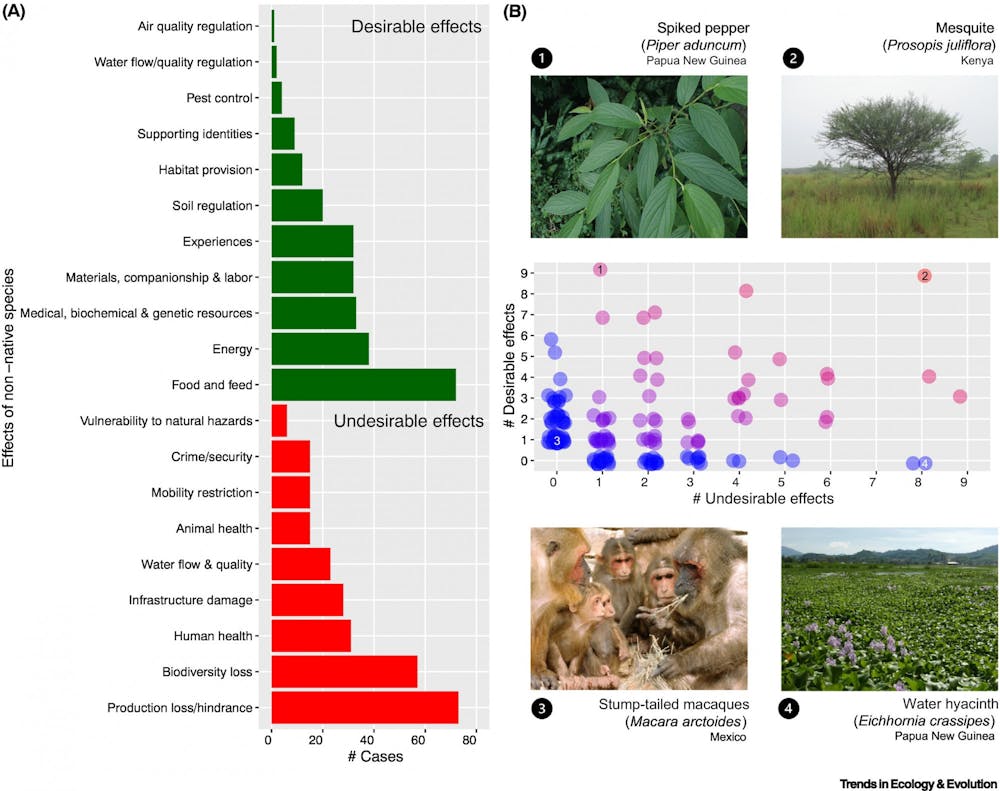Investigators published a review article earlier this month that highlights some of the positive effects of invasive species on human society and nature and emphasizes the need for more balanced research in the field.
Non-native species, defined as a species living outside its native distributional range, are often seen in a negative light, said author of the paper and Interim Director of the Institute at Brown for Environment and Society Dov Sax.
“Most people are aware of non-native species and think of them as a problem, and they often are a problem,” he added. “But they can also produce benefits as well, and some of that is not appreciated.”
The article, which aims to inspire “more balanced” future research on the topic, is meant to “illustrate the diverse ways that non-native species can provide benefits to people and nature,” Sax said. “We’re not trying to say that the benefits outweigh the harms. What we’re saying is that we don’t actually know because there’s not enough research being done of the benefits.”
Invasive species can benefit the economy, improve wellbeing of the local community, help with agricultural production and even play a role in preserving native species that have changed to become dependent on non-native species, said Sax. For example, earthworms are non-native in most of the Midwest, but they can increase agricultural productivity by 25% in some settings, which lowers food prices, he added.
“You can take any exotic introduced species — even those that are the most heinous invasive species — and find something positive in them,” said William Precht, director of marine and coastal programs for Dial Cordy and Associates, who was not an author in the study. Precht took to Twitter to discuss the study and question the benefit of spending equal energy studying the benefits of non-native species.
Muscles have invaded the Great Lakes and have totally “devastated” natural populations of certain bivalves and other invertebrates, said Pretch. But they have also filtered many water bodies that used to have low visibility.
“Some people see that as a good thing, and others see it as a bad thing,” Precht added. “Usually there’s more negative than positive in a lot of these relationships.”
The researchers hope to increase the time and effort spent on investigating positive dimensions of non-native species, according to Martin Schlaepfer, co-author of the paper and senior lecturer at University of Geneva.
“To manage (introduced species and harmful invasive species) parsimoniously, we need to evaluate their diverse impacts,” wrote Schlaepfer in an email to The Herald. “We disagree with biologists who — because a species has once been labeled as invasive — do not think one should consider any of their positive aspects. This could lead to a species being managed in a manner not aligned with the broader interests of society.”
But not all biologists have agreed with the article's conclusions.
Invasive species are “hugely detrimental to human wellbeing,” said Phillip Cassey, head of the Ecology & Evolutionary Biology department and leader of the Invasion Science & Wildlife Ecology Group at The University of Adelaide.
“They are a key driver of species extinction and habitat modification influencing ecosystems in profound and often unpredictable ways,” wrote Phillip Cassey, who was not an author in the study, in an email to the Herald. “By focusing on domesticated species and particular lobby groups, like hunting and fishing groups, the study is misleading in terms of the enormous negative environmental and social impacts that invasive alien species are having.”
The authors anticipated some pushback from senior invasion biologists, wrote Schlaepfer. “By contrast,” he wrote, “we have received messages, generally from younger scientists, who have thanked us for allowing a more objective debate about the relative merits of non-native species to take place.”
Additional reporting contributed by Gabriella Vulakh.
Clarification: This story has been updated to include an additional reporting credit.

Jared is a Senior Staff Writer for Science and Research. He is a senior from Albuquerque, New Mexico studying physiology and biotechnology. Outside of The Herald he likes to fish, ride bikes and research the role of metals in human health and disease.





